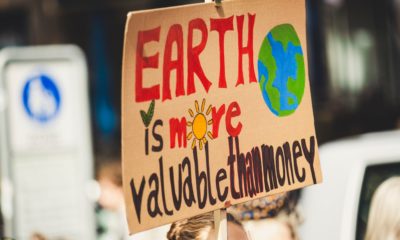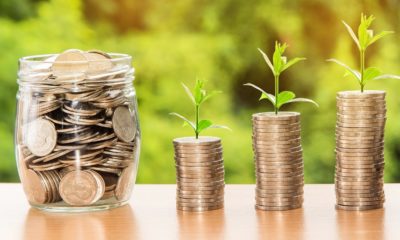Featured
Why sustainable investment is the path to corporate resilience
In recent years, the investment management firm BlackRock, has promoted the trend of “tectonic movement towards sustainability.” That consists of finding financial opportunities within a problem of urgency for the planet, taking into account that companies resilient to climate risks, and which bet on best practices in their operation, have an advantage in the transition to a low-carbon economy.

The company BlackRock explained that last year there was a strong inclination in society’s attitudes towards sustainable development, which has stimulated political pressure, regulatory impulses, and technological advances in this regard. That will translate into a change in investor behavior and will trigger a significant capital reallocation in a gradual way.
“We believe there is a fundamental point that is often overlooked with sustainable investment. A long transition is likely to take place over years and decades, driven by investment flows, which will redesign all asset prices. Because these flows are in their early stages, we believe that the full consequences of a shift to sustainable investment are not yet in market prices, and a return advantage can be gained during this transition.”
In addition, the pandemic has accelerated this and other transformation processes, mainly in the field of technology. “This highlights the need for real resilience in portfolios, in order to protect against various risks, from the vulnerability of global supply chains, to the intensification of the effects of climate change,” the firm pointed out.
Read more about the importance of ESG criteria and be the first to find the most important economic news with our companion app, Born2Invest.
Water scarcity will soon affect several countries across the world
One of the problems affecting all regions, types of sectors and asset classes is water scarcity, which is intensifying with increasing climate-related risks, threatening not only the environment and health, but also production and supply chains, as well as causing geopolitical problems due to the possession of the precious liquid.
According to the United Nations (UN), Mexico ranks seventh in the world in water extraction, and is considered one of the countries that will have a serious shortage in the coming years. This results in an obstacle to economic development. BlackRock pointed out that companies in water-stressed regions could spend more to obtain water, if they do not increase the efficiency of its use and comply with strict environmental regulations.
Other environmental conflicts, such as poor waste management or high emissions of polluting gases, are already affecting companies’ long-term performance. However, real financial damages are not yet reflected in market prices, so “a strategic preference for assets with high sustainability scores could mitigate risks and help provide real resilience to portfolios,” BlackRock stressed.
The firm added that, currently, investors have more options to integrate sustainability into their portfolios, as well as new benchmarks that offer broad market exposure while leaning towards sustainability.
An example of this is Citibanamex’s ESG BLKGLO3 fund, created jointly with BlackRock, whose objective is to invest in a sustainable manner, taking into account three key points: dynamism, since it seeks opportunities and has multi-active investments globally with a long-term focus; security, since it has diversified portfolios, built with liquid and transparent vehicles; and sustainability, since it considers companies with the highest scores with respect to their environmental, social and corporate governance practices. This investment strategy has been available in Mexico since July.
What are ESG practices?
Rocio Canal, Sustainability Partner at Deloitte Mexico, detailed in the BlackRock “Encuentro” podcast, that the quality to select portfolios with sustainable investment opportunities, is that companies operate based on ESG (Environmental, Social and Governance) practices. The environmental aspect has to do with how they identify, measure, manage, and report their environmental impacts, in other words, what those impacts are, how they can be reduced, and how value can be generated through them.
As for the social aspect, it has to do with how it contributes to the development of its human capital and the communities in which it operates. And finally, corporate governance, which refers to the way decisions are made and the way the company is run.
He also stressed that there are reports showing that sustainable companies are more resilient to risk, and that investors in times of uncertainty, such as the present, tend to take refuge in ESG investments.
ESG in the real estate sector
In the real estate sector, ESG practices can be identified as follows:
Environmental, in models of energy efficiency and water management of buildings. Social, in the way a building brings value to its community and tenants. Corporate governance, in recognizing that real estate properties have an extensive supply chain in their different phases of development, so it is important that all those involved in them have good practices or are in the process of improving the way they operate.
Aberdeen Standard, a firm specializing in investment management, considers it crucial to have a clear and detailed policy that is supported by international rating standards, such as the Global Real Estate Sustainability Index (GRESB). Similarly, it emphasizes that the most modern and efficient properties tend to attract the best investors and clients, which contributes at the same time to secure transactions and guarantee rental income.
__
(Featured image by ThorstenF via Pixabay)
DISCLAIMER: This article was written by a third party contributor and does not reflect the opinion of Born2Invest, its management, staff or its associates. Please review our disclaimer for more information.
This article may include forward-looking statements. These forward-looking statements generally are identified by the words “believe,” “project,” “estimate,” “become,” “plan,” “will,” and similar expressions. These forward-looking statements involve known and unknown risks as well as uncertainties, including those discussed in the following cautionary statements and elsewhere in this article and on this site. Although the Company may believe that its expectations are based on reasonable assumptions, the actual results that the Company may achieve may differ materially from any forward-looking statements, which reflect the opinions of the management of the Company only as of the date hereof. Additionally, please make sure to read these important disclosures.
First published in IMMOBILIARE, a third-party contributor translated and adapted the article from the original. In case of discrepancy, the original will prevail.
Although we made reasonable efforts to provide accurate translations, some parts may be incorrect. Born2Invest assumes no responsibility for errors, omissions or ambiguities in the translations provided on this website. Any person or entity relying on translated content does so at their own risk. Born2Invest is not responsible for losses caused by such reliance on the accuracy or reliability of translated information. If you wish to report an error or inaccuracy in the translation, we encourage you to contact us.

-

 Africa1 week ago
Africa1 week agoAgadir Allocates Budget Surplus to Urban Development and Municipal Projects
-

 Cannabis2 weeks ago
Cannabis2 weeks agoKONOPEX Expo 2026: Celebrating Europe’s New Era of Legal Cannabis
-

 Biotech5 days ago
Biotech5 days agoVolatile Outlook for Enlivex Therapeutics as Investors Await Clinical Catalysts
-

 Impact Investing2 weeks ago
Impact Investing2 weeks agoInter IKEA Launches Electric Truck Fleet to Decarbonize Heavy-Duty Logistics in Italy

























